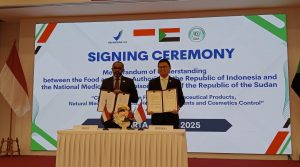 Cairo, 28 Zdulqo’idah 1434/5 Oktober 2013 ( MINA ) – Jordanian Prime Minister Abdalla Ensour said Saturday that Egypt’s stability was “very important” for the Arab world.
Cairo, 28 Zdulqo’idah 1434/5 Oktober 2013 ( MINA ) – Jordanian Prime Minister Abdalla Ensour said Saturday that Egypt’s stability was “very important” for the Arab world.
Speaking during a meeting with Egyptian Premier Hazem al-Beblawi, Ensour said Jordan supported the choices of the Egyptian people on June 30 (the mass protests that led to the ouster of elected president Mohamed Morsi).
Ensour arrived in Egypt on Saturday to attend Egyptian celebrations marking 40th anniversary of military victory over Israel.
“King Abdullah II was the first Arab leader to visit Egypt following June 30,” Ensour said, according to a cabinet statement, Anadolu Agency report quoted by Mi’raj News Agency (MINA).
Also Read: Turkiye Denies $393.7 Million Export Claims to Israel, Calls Reports ‘Disinformation’
He added that Jordan was looking forward to “bolstering cooperation with Egypt in all fields”, congratulating the Egyptians on the 1973 military victory against Israel.
Egypt will mark on Sunday the 40th anniversary of the 1973 military victory against Israel to regain the Sinai Peninsula.
Al-Beblawi, for his part, said the October victory “is a victory for all Arabs, not only the Egyptians”.
Ensour arrived in Cairo earlier Saturday on his first visit to Egypt since Morsi’s overthrow by the military three months ago.
Also Read: Turkish and Iranian Presidents Meet in Azerbaijan
He is scheduled to meet interim President Adly Mansour and attend the celebrations.
Former president Gamal Abdel-Nasser died on 28 September 1970, a few hours after the end of the Arab summit held to address the Black September conflict between the then Palestinian resistance and king Hussein of Jordan. Having spent almost 18 years as the charismatic leader of Egypt and the whole Arab world, Nasser was considered by many as the embodiment of Arab nationalism in its heyday of the 1950s and 1960s.
Also Read: Iran Reaffirms Commitment to Uranium Enrichment
According to US academic James Jankowski, “no Egyptian before or after stirred popular enthusiasm throughout the Arab world to the degree Nasser did after 1955-1965; it is questionable if any Arab leader in the 20th century was ever seen as embodying the hopes and aspirations of politically articulate Arabs as did the Egyptian president after 1956.”
However, pan-Arabism was not a Nasserite invention. Rather, its early beginnings can be traced back to the early decades of the 20th century, when Egyptians started to identify themselves with the grievances of the other Arab peoples in areas like Palestine, Syria, Libya and so on. Among the elites, there was a growing consciousness of the importance of the Arab dimension for Egypt, first in achieving its independence and second in the arrangements that would take place after it.
Also Read: Israel Breaks Ceasefire, Launch Deadly Strike on Lebanon
Egypt’s participation in the 1948 War against Israel represented a climax of this growing sense of solidarity with the Arab people in Palestine that started after the Balfour Declaration, made by British foreign secretary Arthur Balfour in 1917. Commentator Michael Doran has highlighted that for some such elites, “Egyptian dominance meant driving out Britain, which meant frustrating its Hashemite proxies in Iraq and Jordan, which meant joining the wider Arab attack on infant Israel.” What seems astonishing is that some contemporary writers are still questioning Arab nationalism as an appropriate identity for Egyptians, even demanding its omission from the draft of the country’s new constitution. (T/P015/P04)
Mi’raj News Agency (MINA)
Also Read: Prabowo, Prince MBS Call for Concrete Action to End Gaza Crisis






















![MUI Chairman for Foreign Relations and International Cooperation, Sudarnoto Abdul Hakim (center) at the One Million Women for Gaza Press Conference entitled "Women Boycott Pro-Israel Products" held at the Swiss-Belinn Cawang Hotel, East Jakarta, Thursday (3/7/2025). [Photo: Arina/MINA]](https://en.minanews.net/wp-content/uploads/2025/07/20250703_144042-scaled-1-300x225.jpg)




 Mina Indonesia
Mina Indonesia Mina Arabic
Mina Arabic